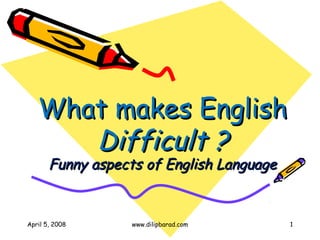What makes-english-difficult-1230657071424212-1 (2)
- 1. April 5, 2008 www.dilipbarad.com What makes EnglishWhat makes English Difficult ?Difficult ? Funny aspects of English LanguageFunny aspects of English Language 1
- 2. April 5, 2008 www.dilipbarad.com What makes English difficult? ? It's vs. Its ? It's is the contracted form of It is. This form is used in sentences using "they" as the subject of the sentence with the verb "to be" used as either the helping verb (e.g. It's going ..., It's raining ...) or the principal verb of the sentence. ? Examples: ? It's difficult to find work these days. It's going to rain soon. 2
- 3. April 5, 2008 www.dilipbarad.com ? Its is the possessive pronoun form. This form is used to express that "it" has a specific quality, or that something belongs to "it". ? Examples: ? I found its taste to be superb! Its color is deep red, almost Burgundy 3
- 4. April 5, 2008 www.dilipbarad.com Has gone to vs. Has been to ? Has gone to vs. Has been to ? ... has/have gone to ... refers to someone who has gone to a place but has not yet returned. ? Examples: ? He's gone to the bank. He should be back soon. ? Where has Tom gone? 4
- 5. April 5, 2008 www.dilipbarad.com Funny aspect of Eglish¡ ? There is no egg in eggplant nor ham in hamburger; neither apple nor pine in pineapple... English muffins were not invented in England or French fries in France. Sweetmeats are candies, while sweetbreads, which aren't sweet, are meat. 5
- 6. April 5, 2008 www.dilipbarad.com ? We take English for granted. But if we explore its paradoxes, we find that quicksand can work slowly, boxing rings are square, and a guinea pig is neither from Guinea nor is it a pig. 6
- 7. April 5, 2008 www.dilipbarad.com ? And why is it that writers write, but fingers don't fing, grocers don't groce, and hammers don't ham? If the plural of tooth is teeth, why isn't the plural of booth beeth? One goose, 2 geese. So, one moose, 2 meese? One index, two indices? Is cheese the plural of choose? 7
- 8. April 5, 2008 www.dilipbarad.com ? If teachers taught, why didn't preachers praught? If a vegetarian eats vegetables, what does a humanitarian eat? 8
- 9. April 5, 2008 www.dilipbarad.com ? In what language do people Ship by truck, and send cargo by ship? Have noses that run and feet that smell? Park on driveways and drive on parkways? How can a slim chance and a fat chance be the same, while a wise man and a wise guy are opposites? How can the weather be hot as hell one day and cold as hell another? 9
- 10. April 5, 2008 www.dilipbarad.com ? When the stars are out, they are visible, but when the lights are out, they are invisible. And why, when I wind up my watch, I start it, but when I wind up this essay, I end it? 10
- 11. April 5, 2008 www.dilipbarad.com Some more¡ ? The soldier decided to desert his dessert in the desert. ? The bandage was wound around the wound. ? A box in the plural becomes is boxes. But an Ox in the plural never becomes oxes. (It becomes Oxen). 11
- 12. www.dilipbarad.com Thank You ! ! ! ? www.dilipbarad.com ? www.wikieducator.org/user:Dilipbarad 12












